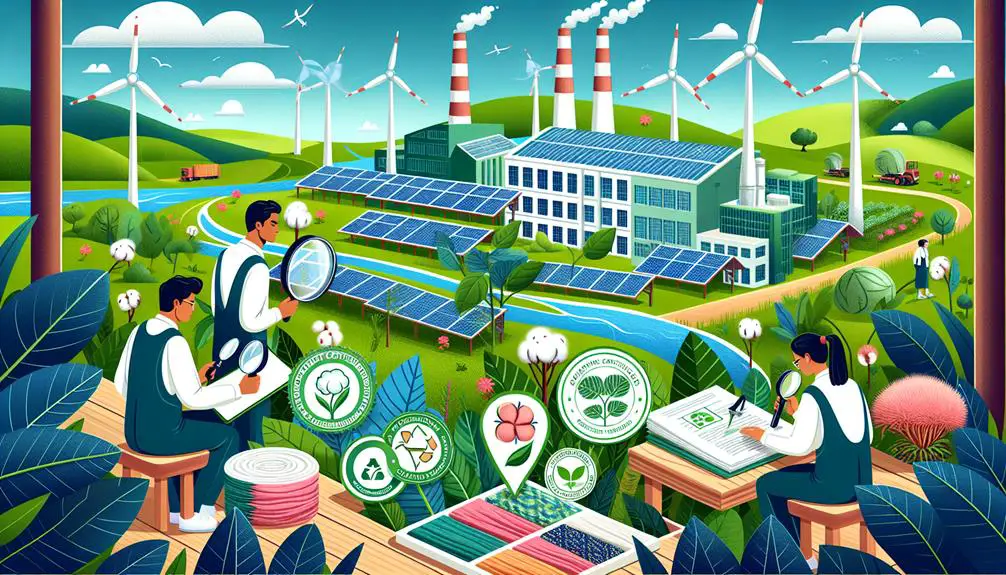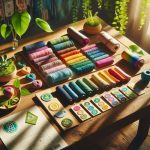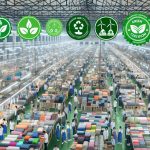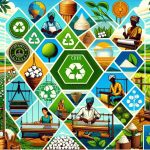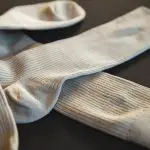You might think certifications are just marketing gimmicks, but they actually guarantee fabrics meet high environmental and ethical standards. When you see labels like GOTS or OEKO-TEX, you know those materials are free from harmful substances and produced responsibly. These certifications help you make informed choices that support sustainable practices. But how do these certifications really affect the industry and your purchasing decisions? Let's explore the true significance of these labels and why they matter more than you might realize.
Table of Contents
Key Takeaways
- Certifications like GOTS and OEKO-TEX ensure fabrics meet stringent environmental and social responsibility criteria.
- Certified sustainable fabrics guarantee materials are free from harmful substances, ensuring safety for consumers.
- Certifications enhance brand reputation and consumer trust by verifying commitment to ethical and eco-friendly practices.
- Sustainable fabric certifications contribute to reduced environmental impact through regulated, pollution-minimizing production processes.
- Certifications facilitate resource efficiency and cost savings by promoting sustainable practices and reducing waste in production.
Importance of Certifications
Certifications in sustainable fabrics are important because they guarantee the materials meet specific environmental and ethical standards. When you choose certified fabrics, you're directly contributing to reduced environmental impact. These certifications ensure that the production processes minimize pollution, conserve resources, and promote biodiversity. By opting for certified sustainable fabrics, you're not just making a personal statement; you're also fostering consumer trust.
Shoppers today are more informed and concerned about the ecological footprint of their purchases. They want assurance that their choices align with their values. For brands, certifications greatly enhance brand reputation. In a competitive market, a certified label can set you apart, showcasing your commitment to sustainability.
It's not just about the end product; it's about proving that your entire supply chain is transparent and ethical. Certifications provide a clear record of the journey from raw material to finished product, reinforcing your dedication to ethical practices. This transparency isn't just a trend; it's a necessity for modern businesses aiming to build long-term relationships with conscientious consumers.
Key Certification Bodies
When you're exploring sustainable fabrics, you can't overlook the importance of key certification bodies.
The Global Organic Textile Standard, OEKO-TEX Standard 100, and Fair Trade Certification are essential to ensuring ethical and eco-friendly practices.
Let's take a closer look at what each of these certifications means for you and the environment.
Global Organic Textile Standard
The Global Organic Textile Standard (GOTS) relies on key certification bodies to guarantee textiles meet stringent environmental and social criteria. By understanding the certification criteria, you can verify that the textiles you're working with are produced sustainably, minimizing environmental impact.
GOTS certification bodies conduct thorough evaluations, confirming that every step from raw materials to final production aligns with high standards.
To master GOTS, focus on these three critical areas:
- Raw Material Integrity: Certification bodies confirm that at least 70% of the fibers are organic. They validate that no harmful chemicals are used, preserving the organic integrity of the product.
- Environmental Impact: These bodies evaluate the ecological footprint of the entire production process. They monitor water usage, waste management, and energy consumption to guarantee minimal environmental impact.
- Social Criteria: Certification bodies also prioritize ethical labor practices. They uphold fair wages, safe working conditions, and the prohibition of child labor.
OEKO-TEX Standard 100
Although the OEKO-TEX Standard 100 primarily focuses on the safety and chemical content of textiles, its key certification bodies guarantee that every product undergoes rigorous testing for harmful substances. When you select fabrics with this certification, you're reassured that they meet strict certification criteria, verifying the absence of harmful chemicals that could impact your health and the environment.
The certification process involves thorough laboratory tests conducted by independent institutes. These tests examine numerous regulated and non-regulated substances, including pesticides, heavy metals, and formaldehyde. By adhering to OEKO-TEX Standard 100, manufacturers commit to sustainable production methods, which minimize environmental impact and promote safer working conditions.
You'll notice that the certification bodies also maintain ongoing compliance through regular audits and unannounced inspections. This strict oversight upholds the integrity of the certification and gives you confidence in the textiles you purchase.
Therefore, when you see the OEKO-TEX Standard 100 label, you know the fabric has been meticulously examined for human-ecological safety.
Fair Trade Certification
For guaranteeing that the fabrics you choose support ethical labor practices and fair wages, Fair Trade Certification plays a pivotal role. This certification demonstrates a commitment to ethical manufacturing and supply chain transparency, allowing you to feel confident about your sustainable fabric choices.
Let's break down the key certification bodies you should be aware of:
- Fair Trade USA: This organization sets stringent standards for ethical manufacturing, ensuring fair wages and safe working conditions. Their certification covers the entire supply chain, providing transparency from farmers to factory workers.
- World Fair Trade Organization (WFTO): WFTO focuses on promoting fair trade practices globally. They certify organizations that adhere to the principles of fair trade, including fair wages, good working conditions, and environmental sustainability.
- Fairtrade International: This body is renowned for its rigorous standards in ethical manufacturing and supply chain transparency. They guarantee that producers receive fair prices and that workers enjoy safe working conditions and equitable pay.
Eco-Friendly Standards
When you're considering sustainable fabrics, it's important to understand recognized industry benchmarks. Eco-labels play a significant role in helping you make informed choices.
Certification compliance not only benefits the environment but also enhances brand credibility.
Recognized Industry Benchmarks
Industry benchmarks play a crucial role in ensuring the sustainability of fabrics in the textile industry. Certifications such as the Global Organic Textile Standard (GOTS) and OEKO-TEX® Standard 100 guarantee that sustainable fabrics meet stringent environmental and social criteria. These certifications not only verify the sustainability impact of chosen fabrics but also enjoy wide recognition across the industry.
By aligning with standards like GOTS and OEKO-TEX® Standard 100, businesses demonstrate their commitment to eco-friendly practices while contributing to a healthier planet. These certifications are a testament to the responsible sourcing of materials and ethical production practices.
To fully understand the significance of these benchmarks, it is essential to consider each certification's unique features:
- GOTS Certification: This standard ensures that textiles are crafted from organic fibers and adhere to rigorous environmental and social responsibility standards throughout the entire supply chain.
- OEKO-TEX® Standard 100: This certification rigorously tests fabrics for harmful substances, ensuring they are safe for human use. The label is widely recognized as a symbol of trust and safety in the textile industry.
- Bluesign® System: This benchmark evaluates the entire manufacturing process, focusing on minimizing environmental impact from the initial stages of production. It emphasizes sustainable practices and responsible resource management.
Eco-Label Importance
In today's market, eco-labels play a vital role in helping consumers identify truly sustainable fabrics. You're likely aware that not all 'green' claims are created equal. Eco-labels serve as a reliable guide, educating you on which products meet strict environmental standards. By understanding these labels, you can make informed choices that significantly lessen your environmental impact.
When you see an eco-label, it's more than just a sticker. It's a sign to a fabric's journey from raw material to finished product. Eco-labels verify that each step of production – whether it's sourcing, manufacturing, or transportation – meets high ecological criteria. This transparency is important for consumer education, empowering you to support brands that prioritize sustainability.
Moreover, eco-labels simplify the decision-making process. They distill complex information into easy-to-understand symbols, saving you time and effort in researching each product's environmental credentials. By trusting these labels, you can focus on enjoying high-quality fabrics without compromising your values.
In essence, eco-labels are essential tools for anyone committed to sustainable living. They not only inform but also inspire you to make choices that positively impact our planet.
Certification Compliance Benefits
Adhering to eco-friendly standards in fabric certification offers numerous benefits for both consumers and the environment. First and foremost, when you confirm compliance with sustainable certifications, you contribute to significant cost savings. This happens because eco-friendly practices often reduce waste and improve resource efficiency, which ultimately lowers production costs.
Additionally, certifications can streamline your supply chain by making it easier to identify and work with other certified businesses, enhancing collaboration and trust.
Here are three key benefits of certification compliance:
- Cost Savings: Sustainable practices can lead to reduced waste and energy use, translating into lower production costs over time.
- Enhanced Marketability: Eco-friendly certifications can make your products more appealing to a growing segment of environmentally conscious consumers, boosting your market position.
- Regulatory Compliance: Certifications confirm that you meet or exceed regulatory requirements, reducing the risk of penalties and improving your business's reputation.
Ethical Sourcing Practices
To safeguard ethical sourcing practices, it's vital to verify that every step of your fabric supply chain respects both human rights and environmental standards. Start by demanding transparency and accountability from every partner involved. You need to secure that raw materials are sourced responsibly, workers are treated fairly, and environmental impacts are minimized. This means scrutinizing everything from the farming methods used to grow natural fibers, to the labor conditions in textile factories.
Ethical sourcing isn't just about compliance; it's about creating a value-driven ecosystem. You should prioritize suppliers who demonstrate a commitment to ethical labor practices and sustainable resource management. Certifications like Fair Trade and GOTS (Global Organic Textile Standard) can serve as valuable indicators of adherence to these principles.
These certifications help you validate that your supply chain is clean, mitigating risks and building trust with stakeholders.
Consumer Awareness
Educating consumers about the importance of sustainable fabrics empowers them to make informed purchasing decisions. When you grasp the impact of your choices, you're more likely to opt for products that align with your values. Ethical production and sustainable fashion aren't just buzzwords; they're pivotal in driving systemic change in the industry.
Here's how you can enhance your consumer awareness:
- Research Certifications: Look for trusted certifications that guarantee ethical production. Labels like GOTS (Global Organic Textile Standard) and OEKO-TEX ascertain that fabrics are produced sustainably and safely.
- Understand Materials: Familiarize yourself with eco-friendly materials. Organic cotton, bamboo, and recycled polyester are excellent alternatives to traditional textiles that often harm the environment.
- Demand Transparency: Hold brands accountable by requesting transparency in their supply chains. Companies committed to sustainable fashion should openly share their practices and progress.
Market Demand Trends
Market demand for sustainable fabrics is surging as consumers increasingly prioritize eco-friendly and ethically produced textiles. You're seeing a shift in consumer preferences towards products that champion sustainable sourcing and minimize environmental impact. This trend is reshaping the textile industry, compelling companies to adapt to these new demands.
When you choose sustainable fabrics, you're not just making a fashion statement; you're actively reducing your environmental footprint. Consumers like you're driving this change by seeking out certifications that verify eco-friendly practices and ethical production. This demand is pushing brands to be transparent about their sourcing processes and environmental impact, ensuring that their textiles meet stringent standards.
Moreover, the textile industry is responding to your preferences by innovating with sustainable materials and production methods. From organic cotton to recycled polyester, brands are expanding their offerings to cater to the eco-conscious market. By prioritizing these certified sustainable fabrics, you're supporting a move towards a more responsible and environmentally-friendly industry.
Your influence as a consumer is undeniable. By favoring brands that commit to sustainable sourcing, you're contributing to a larger movement that's transforming the textile industry for the better.
Future of Sustainable Fabrics
The future of sustainable fabrics looks promising as innovation and consumer demand drive the industry towards more eco-friendly solutions. You're at the forefront of this transformative era, where the emphasis is on innovative materials and supply chain transparency.
- Innovative Materials: Expect to see groundbreaking advancements in fabrics made from recycled plastics, bio-based fibers, and even lab-grown materials. These innovations not only reduce waste but also lessen the reliance on traditional, resource-intensive textiles.
- Supply Chain Transparency: A transparent supply chain is no longer optional; it's a necessity. Consumers and stakeholders are demanding to know the origins of materials and the ethical practices involved. New technologies like blockchain are making it easier to track and verify every step, ensuring accountability and trust.
- Circular Economy: The shift towards a circular economy is gaining momentum. Brands are increasingly adopting practices that emphasize recycling, upcycling, and designing products with end-of-life in mind. This approach not only conserves resources but also aligns with the growing consumer expectation for sustainability.
Frequently Asked Questions
How Do Certifications Impact the Cost of Sustainable Fabrics?
Certifications directly impact the cost of sustainable fabrics, often increasing it. However, they enhance consumer perception, making the higher price more acceptable. You'll find that knowledgeable shoppers value certified products and are willing to pay a premium.
Are There Region-Specific Certifications for Sustainable Fabrics?
Yes, there are region-specific certifications for sustainable fabrics. These certifications vary in their criteria, affecting global impact. They guarantee transparency and build consumer trust, empowering you to make informed sustainable choices in different regions.
How Can Small-Scale Producers Obtain Certifications for Their Fabrics?
To obtain certifications for your fabrics, start by researching the certification process and budget considerations. Prioritize certifications that align with your values and market needs. Efficient planning and resource allocation will streamline your path to certification.
What Are the Challenges in Maintaining Certification Standards?
Did you know 60% of certified products face compliance issues? Maintaining certification standards is tough due to oversight challenges, ensuring certification validity, and transparency. You must constantly monitor practices to uphold the stringent requirements.
Can Uncertified Fabrics Still Be Considered Sustainable?
Yes, you can consider uncertified fabrics sustainable if their environmental impact is low and they follow ethical sourcing practices. However, without certification, it's harder to verify these claims, so research and transparency become essential.
- How Does Ring Spun Cotton Affect Garment Fit and Shape Retention? - August 13, 2024
- What Are the Challenges in Producing Ring Spun Cotton? - August 13, 2024
- Is Ring Spun Cotton Suitable for Plus-Size Clothing? - August 13, 2024

